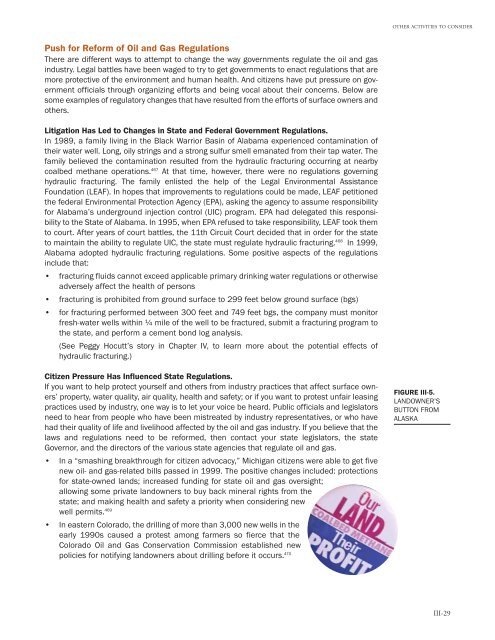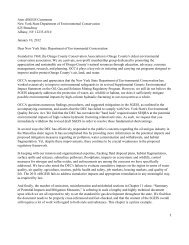Oil and Gas at Your Door? (2005 Edition) - Earthworks
Oil and Gas at Your Door? (2005 Edition) - Earthworks
Oil and Gas at Your Door? (2005 Edition) - Earthworks
Create successful ePaper yourself
Turn your PDF publications into a flip-book with our unique Google optimized e-Paper software.
OTHER ACTIVITIES TO CONSIDER<br />
Push for Reform of <strong>Oil</strong> <strong>and</strong> <strong>Gas</strong> Regul<strong>at</strong>ions<br />
There are different ways to <strong>at</strong>tempt to change the way governments regul<strong>at</strong>e the oil <strong>and</strong> gas<br />
industry. Legal b<strong>at</strong>tles have been waged to try to get governments to enact regul<strong>at</strong>ions th<strong>at</strong> are<br />
more protective of the environment <strong>and</strong> human health. And citizens have put pressure on government<br />
officials through organizing efforts <strong>and</strong> being vocal about their concerns. Below are<br />
some examples of regul<strong>at</strong>ory changes th<strong>at</strong> have resulted from the efforts of surface owners <strong>and</strong><br />
others.<br />
Litig<strong>at</strong>ion Has Led to Changes in St<strong>at</strong>e <strong>and</strong> Federal Government Regul<strong>at</strong>ions.<br />
In 1989, a family living in the Black Warrior Basin of Alabama experienced contamin<strong>at</strong>ion of<br />
their w<strong>at</strong>er well. Long, oily strings <strong>and</strong> a strong sulfur smell eman<strong>at</strong>ed from their tap w<strong>at</strong>er. The<br />
family believed the contamin<strong>at</strong>ion resulted from the hydraulic fracturing occurring <strong>at</strong> nearby<br />
coalbed methane oper<strong>at</strong>ions. 467 At th<strong>at</strong> time, however, there were no regul<strong>at</strong>ions governing<br />
hydraulic fracturing. The family enlisted the help of the Legal Environmental Assistance<br />
Found<strong>at</strong>ion (LEAF). In hopes th<strong>at</strong> improvements to regul<strong>at</strong>ions could be made, LEAF petitioned<br />
the federal Environmental Protection Agency (EPA), asking the agency to assume responsibility<br />
for Alabama’s underground injection control (UIC) program. EPA had deleg<strong>at</strong>ed this responsibility<br />
to the St<strong>at</strong>e of Alabama. In 1995, when EPA refused to take responsibility, LEAF took them<br />
to court. After years of court b<strong>at</strong>tles, the 11th Circuit Court decided th<strong>at</strong> in order for the st<strong>at</strong>e<br />
to maintain the ability to regul<strong>at</strong>e UIC, the st<strong>at</strong>e must regul<strong>at</strong>e hydraulic fracturing. 468 In 1999,<br />
Alabama adopted hydraulic fracturing regul<strong>at</strong>ions. Some positive aspects of the regul<strong>at</strong>ions<br />
include th<strong>at</strong>:<br />
• fracturing fluids cannot exceed applicable primary drinking w<strong>at</strong>er regul<strong>at</strong>ions or otherwise<br />
adversely affect the health of persons<br />
• fracturing is prohibited from ground surface to 299 feet below ground surface (bgs)<br />
• for fracturing performed between 300 feet <strong>and</strong> 749 feet bgs, the company must monitor<br />
fresh-w<strong>at</strong>er wells within ¼ mile of the well to be fractured, submit a fracturing program to<br />
the st<strong>at</strong>e, <strong>and</strong> perform a cement bond log analysis.<br />
(See Peggy Hocutt’s story in Chapter IV, to learn more about the potential effects of<br />
hydraulic fracturing.)<br />
Citizen Pressure Has Influenced St<strong>at</strong>e Regul<strong>at</strong>ions.<br />
If you want to help protect yourself <strong>and</strong> others from industry practices th<strong>at</strong> affect surface owners’<br />
property, w<strong>at</strong>er quality, air quality, health <strong>and</strong> safety; or if you want to protest unfair leasing<br />
practices used by industry, one way is to let your voice be heard. Public officials <strong>and</strong> legisl<strong>at</strong>ors<br />
need to hear from people who have been mistre<strong>at</strong>ed by industry represent<strong>at</strong>ives, or who have<br />
had their quality of life <strong>and</strong> livelihood affected by the oil <strong>and</strong> gas industry. If you believe th<strong>at</strong> the<br />
laws <strong>and</strong> regul<strong>at</strong>ions need to be reformed, then contact your st<strong>at</strong>e legisl<strong>at</strong>ors, the st<strong>at</strong>e<br />
Governor, <strong>and</strong> the directors of the various st<strong>at</strong>e agencies th<strong>at</strong> regul<strong>at</strong>e oil <strong>and</strong> gas.<br />
• In a “smashing breakthrough for citizen advocacy,” Michigan citizens were able to get five<br />
new oil- <strong>and</strong> gas-rel<strong>at</strong>ed bills passed in 1999. The positive changes included: protections<br />
for st<strong>at</strong>e-owned l<strong>and</strong>s; increased funding for st<strong>at</strong>e oil <strong>and</strong> gas oversight;<br />
allowing some priv<strong>at</strong>e l<strong>and</strong>owners to buy back mineral rights from the<br />
st<strong>at</strong>e; <strong>and</strong> making health <strong>and</strong> safety a priority when considering new<br />
well permits. 469<br />
• In eastern Colorado, the drilling of more than 3,000 new wells in the<br />
early 1990s caused a protest among farmers so fierce th<strong>at</strong> the<br />
Colorado <strong>Oil</strong> <strong>and</strong> <strong>Gas</strong> Conserv<strong>at</strong>ion Commission established new<br />
policies for notifying l<strong>and</strong>owners about drilling before it occurs. 470<br />
FIGURE III-5.<br />
LANDOWNER’S<br />
BUTTON FROM<br />
ALASKA<br />
III-29




